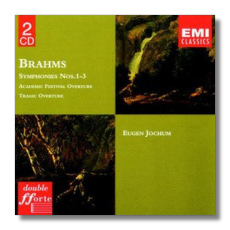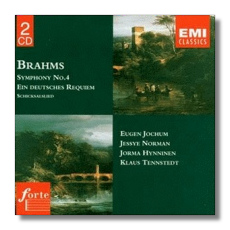
The Internet's Premier Classical Music Source
Related Links
- Brahms Reviews
- Latest Reviews
- More Reviews
-
By Composer
-
Collections
DVD & Blu-ray
Books
Concert Reviews
Articles/Interviews
Software
Audio
Search Amazon
Recommended Links
Site News
 CD Review
CD Review
Johannes Brahms

Symphonies
- Symphony #1 Op. 68 (1876)
- Symphony #2 Op. 73 (1877)
- Symphony #3 Op. 90 (1883)
- Academic Festival Overture Op. 80 (1880)
- Tragic Overture Op. 81 (1880)
London Philharmonic Orchestra/Eugen Jochum
EMI Double Forte 69515 2CDs


- Symphony #4 Op. 98 1 (1885)
- Ein Deutsches Requiem Op. 45 2 (1866)
- Hyperions Schicksalslied (Song of Destiny) for chorus and orchestra, Op. 54 3
2 Jessye Norman, soprano
2 Jorma Hynninen, baritone
2,3 London Philharmonic Chorus
2,3 BBC Symphony Chorus
1 London Philharmonic Orchestra/Eugen Jochum
2,3 London Philharmonic Orchestra/Klaus Tennstedt
EMI Double Forte 69518 2CDs
As I began working on this set of Brahms Symphonies it occurred to me that I must like these symphonies more than I realize. I noticed that have more integral sets of them than any other cycle. I have Stokowski with the Philadelphia (the first ever cycle), Furtwängler on EMI conducting different orchestras (so not technically a cycle), Walter, and Kertész. Barbirollis leased from EMI is on the way. I am trying to get Kubelíks, too. In addition, I have individual recordings by Stokowski in his later years, Munch, Belholavek, Loughran, Bernstein, Klemperer, and probably a few more. So, how does Jochum align with these stars?
The answer is, "Very well, thank you." I think that Jochum is more like Furtwängler than Stokowski, or even Bruno Walter. On the other hand, I sense a slight bit more warmth in Jochum than in Furtwängler. Oddly, the last Brahms cycle I reviewed was also on EMI, Furtwänglers! Then I noted a preference for Stokowski if you wanted a historical cycle. What about a stereo one? Well, I would definitely want both Bruno Walter and Eugen Jochums!!!! I do not care for Karajan, but have to admit that any of the cycles mentioned so far are much more fulfilling than any digital set I can think of. Jochum has "character" whereas Abbado, to mention one, is merely going through the motions. Frankly, I find the recording detail in Jochums set as wonderfully insightful as any digital set and there is a warmth in the recording that is pleasant.
Okay, how about a few specifics? In repeated listenings it seems to me that Jochum has the coda of the final movement in mind from the outset of these symphonies. It is as if he knows what hes aiming for and he will get us there. There is nothing wrong with that idea, I am just mentioning it because the finales of each symphony in this cycle is taut and riveting, as if we had been prepared for this from the opening bars This inevitability is one of those Furtwänglerian elements I have referred to. It is also Beethovian. In that earlier review I mentione that some conductors seem to interpret Brahms as Beethovens heir. As I said then, this is not my perception. I prefer the insights of Stokowski or Walter, but am impressed with those of Jochum. The finale of the Third Symphony in this cycle is riveting. The recording at this point brings out an interplay that is fascinating. The First Symphony actually reminds me more of Klemperer than of Furtwängler, and that is no criticism, either.
Now I want to digress a moment. In a posting on a classical forum I visit, recently a contributor mentioned a likeness between the opening of Mahler's 1st Symphony and a similar moment about 5 minutes into the fourth movement of Brahms' Second Symphony. Well, I did some checking. Sure, enough, the same seven notes that open the Mahler are there!! On the other hand, how each conductor had the orchestra play those notes was a study in interpretation. Bruno Walter's recording is eerie. It is as if they had taken the opening of Walter's stereo recording of the Mahler 1 and patched it into this moment in Brahms Second Symphony. While Stokowski and Jochum play those same notes, with the strings providing a cushion in the background, they are not as Mahlerian. It i a matter of not only timing, but of emphasis on notes that creates this different feeling.
Now, to the Jochum set. The first symphony is, frankly, not my favorit Brahms work. I do like Stokowskis way with it in his 1940 All-American Youth Orchestra recording (released by the Leopold Stokowski Society of America in 1994 and now available on Music and Arts). As I said in my last review of Brahms Symphonies, I hear this symphony as Brahms farewell to Beethoven In some cases, and Jochum is like Furtwängler in this instance, I hear Beethovens 10th . While this is a valid interpretation, I prefer how Stokowski handles it. Kertész and Walter also imbue this symphony with a more lyrical sound. Among my favorite digital versions is Belholavek with the Czech Philharmonic on Supraphon.
The second and third symphonies are riveting. That is the word that go jotted down most often in my notes. What I noted, also, is that Jochum seems to have the coda of the finale in mind from the beginning. It is as if he knows where things are going and drives you there. The ending of the third symphony is intense. I would recommend this two-disc set just for these interpretations. On the other hand, I would also suggest that you need to have Bruno Walters same coupling on Sony. Again, Walter imbues these pieces with a lyrical atmosphere not to be heard in Jochum. Another favorite second of mine is Kertész on London (coupled with a CD containing the 1st Symphony). Another Brahms Second and Third worth seeking is with James Loughran and the Hallé Orchestra on Classics for Pleasure. These are on two separate discs. They are nla but if you come across either in some cut-out bin your modest investment will be rewarded.
Now we go to the Fourth Symphony, coupled with "A German Requiem". You know, I have always found this the most difficult Brahms Symphony to bring off well. Handled one way, it comes across too much as an academic exercise. Then there is Stokowski's 1940 recording with the All-American Youth Orchestra on Columbia (also on Music and Arts). That is the weirdest thing have ever heard. The first movement sounds more like a rhapsody; you might not even recognize it. To be frank, while you would not be disappointed in this last Forte set, I cannot give it as strong a recommendation as the prior one. I would suggest you invest in Bruno Walters recording with the Columbia Symphony Orchestra on Sony. If you are familiar with Tennstedt's Brahms Requiem and like it, this might tip the scales in this releases favor. I find it very good, but on the slow side, lacking the tension in Klemperer's famous recording for the same company.
So, if you want to invest in a reasonably priced, stereo set this EMI series will not disappoint you, especially if you like your Brahms in a more Furtwänglerian mode. I would urge you to add the first set, with the first three symphonies and a couple overtures. Another mid-priced stereo cycle to consider is on London/Decca with the VPO and Kertész. Frankly, the VPO plays this music as if it was written for it and the conductor was no slouch. Still, for a stereo version I have not heard anyone who has displaced Bruno Walter's recordings made in the Indian Summer of his life. My personal favorite cycle, however, is Stokowski with the Philadelphia Orchestra (on Biddulph WHL 017-18). What an orchestra, what a genius at the helm. The sound is excellent for its vintage with an inner detail that almost belies its age.
Well, I hope I have introduced a degree of cognitive dissonance to your world. I really liked listening to these discs. I am particularly taken with the Brahms 2 and 3. Despite my reservations I believe you will also enjoy listening to these. You notice that no digital cycle has been discussed. This is because I have not heard any that measure up to those mentioned herein.
Copyright © 1997, Robert Stumpf II



















